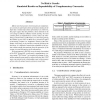Free Online Productivity Tools
i2Speak
i2Symbol
i2OCR
iTex2Img
iWeb2Print
iWeb2Shot
i2Type
iPdf2Split
iPdf2Merge
i2Bopomofo
i2Arabic
i2Style
i2Image
i2PDF
iLatex2Rtf
Sci2ools
84
Voted
IEEEARES
2006
IEEE
2006
IEEE
No Risk is Unsafe: Simulated Results on Dependability of Complementary Currencies
Efforts have been put for electronization of complementary currencies (alternative forms of monetary media) in the hope that it would reduce their operational cost. However, this paper argues that the problem is more inherent in the core design of MCS[7] (Mutual Credit System), the most common form of complementary currency today. By simulating a small world of 2,500 traders, we show that growing the number of free-riders in MCS has a paradoxical effect of increasing “welfare” (a “happiness” metric) of the community. Since there is no pressure to stop the growth of the bad users, it is difficult to sustain the soundness of the system without strong interventions from the operators of the system; we need alternatives to the alternatives. We have proposed i-WAT[6] as an electronic descendant of the WAT System[10], a polycentric complementary currency using “WAT tickets” as its media of exchange. A simulation using the same model as above indicates that i-WAT users can susta...
Complementary Currency | Complementary Currency Today | IEEEARES 2006 | Mutual Credit System | Security Privacy |
| Added | 11 Jun 2010 |
| Updated | 11 Jun 2010 |
| Type | Conference |
| Year | 2006 |
| Where | IEEEARES |
| Authors | Kenji Saito, Eiichi Morino, Jun Murai |
Comments (0)

